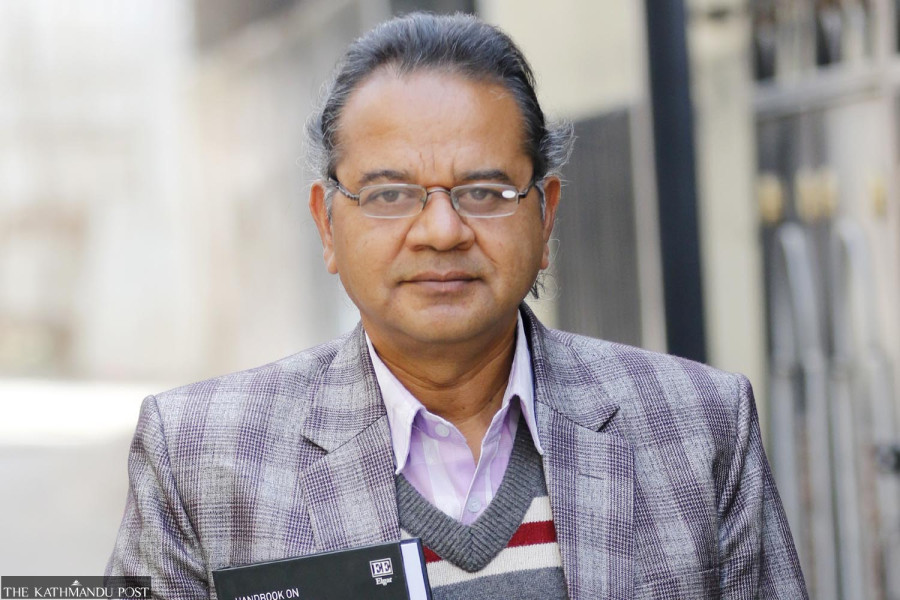Books
Learning should reflect on behaviour
Narendra Raj Paudel talks about public administration and broader understanding of reading in general.
Manushree Mahat & Keshav Thapa
Narendra Raj Paudel is the associate professor of public administration at the Central Department of Public Administration at Tribhuvan University (TU). He is a researcher who has written articles and books on public administration, including ‘Public Administration and Federalism in Nepal’. With a PhD in public policy implementation, he is committed to raising critical questions about society to make tangible changes through public administration.
In this interview with the Post’s Manushree Mahat and Keshav Thapa, Paudel talks about his education in public administration, his career as a professor, and the significance of reading in making effective changes in administration.
You like to talk about the significance of personality development in shaping students to be active members of society. Could you elaborate on the role of reading in this process?
Reading encourages curiosity, it opens your mind to the puzzles, uncertainties, and ambiguities around you. It helps fill the gaps in your knowledge. Reading instills values that will lead you to become an active member of the community, who understands the problems of those around you. Reading is not about taking and storing information—it is about internalising it and using it for the greater good of society.
When you read, you learn to empathise, you use your understanding in greater sensitivity to analyse the woes of the public. You can get certificates and degrees all you want, but it’s the qualities you acquire through reading and translating into behaviour that truly makes a difference.
How did you get into public administration?
I completed high school in my village in Syangja. Then I pursued my IsC at Trichandra Campus in Kathmandu, where I worked hard to place second in my exams. Despite my efforts, my chance of getting a scholarship was dashed as it was awarded to children of politicians. I had to start earning money to pay for my tuition and living in the Capital, so I took up various jobs to make ends meet. I even became second lieutenant, and considered becoming an inspector, but the daunting reality of the Maoist insurgency was overwhelming. Although I completed my BSc, it was when I began my masters of public administration (MPA) that I began shaping into the person I am today. Discovering a passion for public administration made me realise that this was a path I could pursue.
Later, when the opportunity to apply for a lecturer position at Tribhuvan University arose, I applied and was accepted.
I went on to pursue my PhD in Norway in 2008. This experience was transformative in many ways, as I realised that much of what I had learned until then might as well have been useless. I would even go as far as to say that all my certificates and degrees before that could have been burnt, as I had overlooked a crucial aspect of being a worthwhile student—developing opinions and asking questions. This realisation marked a turning point in my life, I realised that developing your own opinions is a significant part of moving ahead in life.
Then I got the opportunity to be a member secretary of the MPhil programme at TU. I was also highly involved in developing the syllabus for the BPA programme. Throughout my years of engagement with students, understanding their problems and personalities has been a major focus of my teaching approach. I have prioritised teaching my students to avoid rote learning and to read for understanding, analysis, empathy and internalisation for application.
Application lies at the heart of public administration development, and reading to formulate questions to address enduring societal issues has always been integral to my approach.
Is the education system failing students, or is the lack of implementation of existing rules the problem with our schooling?
One major issue is that we’ve imported ideas and knowledge from Western countries to implement them in our education system, overlooking our conditions and resources. It’s not a matter of being poor; rather, it’s about not fully utilising the resources available to us.
From my experience supervising and evaluating students, I’ve observed that those who genuinely apply themselves to their education and adhere to the taught methodologies tend to pursue honest careers. Conversely, those who consistently resort to cheating in college often continue this pattern into corrupt practices later on.
A critical deficiency in our education system is the lack of effective screening of students to differentiate between those with positive and negative qualities. Instead of honest, hardworking students rising to the top, everyone is given equal opportunity, even those who may not merit it. Consequently, students who cheat may not grasp the long-term consequences of their actions, not just for themselves but also for society as a whole.
How do you cultivate critical thinking skills in your students, teaching them to form opinions and ideas through reading?
There are many theories, developmental theories, both national and international, government, laws, and reports that make up the public administration syllabus. I connect these theories with current issues relevant to Nepali society.
After that, I make my students study these issues—assign them articles and essays—and subsequently deliver their own presentations on the given topic. But the process does not end there. As they complete their presentation, I critique them. This may be harsh, putting them on the spot with an audience, but it will teach them to think and internalise what they’ve learned from the topic. Fostering a robust personality in students that is receptive to discourse, questioning, and differing opinions is crucial for building a strong foundation in public administration.
Narendra Raj Paudel’s book recommendations
Handbook on Asian Public Administration
Editors: M S Hague, Kilkon Ko, Wilson Wong
Publisher: Edward Elgar Publication
Year: 2023
‘Handbook on Asian Public Administration’ by Hague, Ko and Wong talks about the complexities of Asian public administration. As someone who researches Nepal’s public administration, it helps me understand the intricacies of the field.
In Search of Better Governance in South Asia and Beyond
Editors: Ishtiaq Jamil, Steiner Askvik, Tek Nath Dhakal
Publisher: Springer New York
Year: 2013
This is another book that helps you understand society as a whole. It also makes you question what you know.
Civil Service Management and Administrative Systems in South Asia
Editors: Ishtiaq Jamil, Tek Nath Dhakal, Narendra Raj Paudel
Publisher: Palgrave Macmillan
Year: 2019
As one of the writers of this book, and having previously conducted experimental research on civil service management, I often come back to it to review the administrative rules and regulations of South Asia.
Bhagavad Gita
Author: Vyasa
You can apply the lessons from the ‘Bhagavad Gita’ to modern society and even public administration. For instance, it teaches us not to sabotage someone else’s work or to engage in corruption of any kind.
Sapiens: A Brief History of Humankind
Author: Yuval Noah Harari
Publisher: Random House Harper (English)
Year: 2014
I enjoy the way Harari has written about cognitive power, collaboration and gender. The manner in which he has connected a lot of things to recount history cohesively is commendable.




 14.12°C Kathmandu
14.12°C Kathmandu











